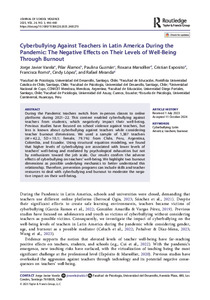Por favor, use este identificador para citar o enlazar este ítem:
https://repositorio.uca.edu.ar/handle/123456789/20042| Campo DC | Valor | Lengua/Idioma |
|---|---|---|
| dc.contributor.author | Varela, Jorge Javier | es |
| dc.contributor.author | Álamos, Pilar | es |
| dc.contributor.author | Guzmán, Paulina | es |
| dc.contributor.author | Marsollier, Roxana | es |
| dc.contributor.author | Expósito, Cristián David | es |
| dc.contributor.author | López, Cindy | es |
| dc.contributor.author | Miranda, Rafael | es |
| dc.date.accessioned | 2025-07-08T12:39:20Z | - |
| dc.date.available | 2025-07-08T12:39:20Z | - |
| dc.date.issued | 2025 | - |
| dc.identifier.issn | 1538-8220 | - |
| dc.identifier.issn | 1538-8239 | - |
| dc.identifier.uri | https://repositorio.uca.edu.ar/handle/123456789/20042 | - |
| dc.description.abstract | During the Pandemic teachers switch from in-person classes to online platforms during 2021–22. This context enabled cyberbullying against teachers from students, which negatively impact their well-being. Previous studies have focused on school violence against teachers, but less is known about cyberbullying against teachers while considering teacher burnout dimensions. We used a sample of 1,387 teachers (M = 42.2, SD = 10.1; female, 79.1%) from Chile, Peru, Argentina, Colombia, and Ecuador. Using structural equation modeling, we found that higher levels of cyberbullying are associated with lower levels of teachers’ well-being and mediated by psychological exhaustion but not by enthusiasm toward the job scale. Our results confirm the adverse effects of cyberbullying on teachers’ well-being. We highlight two burnout dimensions as possible underlying mechanics to better understand this relationship. Therefore, prevention programs can include skills and teacher resources to deal with cyberbullying and burnout to moderate the negative impact on their well-being. | es |
| dc.format | application/pdf | es |
| dc.language.iso | spa | es |
| dc.publisher | Taylor & Francis | es |
| dc.rights | Atribución 4.0 Internacional | * |
| dc.rights.uri | http://creativecommons.org/licenses/by/4.0/ | * |
| dc.source | Journal of School Violence. 2025, 24(3) | es |
| dc.subject | BULLYING | es |
| dc.subject | CYBERBULLYING | es |
| dc.subject | BURNOUT | es |
| dc.subject | AMERICA LATINA | es |
| dc.subject | DOCENTES | es |
| dc.title | Cyberbullying Against Teachers in Latin America During the Pandemic: The Negative Effects on Their Levels of Well-Being Through Burnout | es |
| dc.type | Artículo | es |
| dc.identifier.doi | 10.1080/15388220.2025.2483270 | - |
| uca.issnrd | 0 | es |
| uca.affiliation | Fil: Varela, Jorge Javier. Universidad del Desarrollo. Facultad de Psicología; Chile | es |
| uca.affiliation | Fil: Álamos, Pilar. Pontificia Universidad Catolica de Chile. Facultad de Educación; Chile | es |
| uca.affiliation | Fil: Guzmán, Paulina. Universidad del Desarrollo. Facultad de Psicología; Chile | es |
| uca.affiliation | Fil: Marsollier, Roxana. Universidad Nacional de Cuyo; Argentina | es |
| uca.affiliation | Fil: Marsollier, Roxana. Consejo Nacional de Investigaciones Científicas y Técnicas; Argentina | es |
| uca.affiliation | Fil: Expósito, Cristián. Consejo Nacional de Investigaciones Científicas y Técnicas; Argentina | es |
| uca.affiliation | Fil: Expósito, Cristián. Universidad Nacional de Cuyo; Argentina | es |
| uca.affiliation | Fil: Expósito, Cristián. Pontificia Universidad Católica Argentina. Facultad de Humanidades y Ciencias Económicas; Argentina | es |
| uca.version | publishedVersion | es |
| item.languageiso639-1 | es | - |
| item.grantfulltext | mixedopen | - |
| item.fulltext | With Fulltext | - |
| Aparece en las colecciones: | Artículos | |
Ficheros en este ítem:
| Fichero | Descripción | Tamaño | Formato | Login |
|---|---|---|---|---|
| cyberbullying-against.pdf | 592,74 kB | Adobe PDF | SOLICITAR ACCESO | |
| thumb.pdf | 164,68 kB | Adobe PDF |  Visualizar/Abrir |
Este ítem está sujeto a una Licencia Creative Commons

